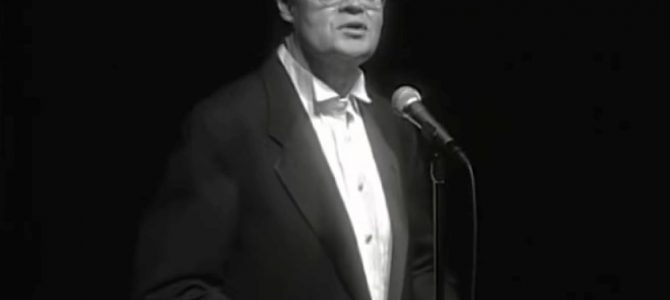
“I’m looking for a new religion.” Thus saith Garrison Keillor, America’s most beloved Lutheran humorist, a rather odd title for a man who is neither Lutheran nor humorous. (If you disagree with the latter, watch this clip and remember that season five of “The Simpsons” declaring you unfunny is the comedic equivalent of the pope saying you’re not Catholic.)
So what has set Keillor on his mission to find a new house of worship? Donald Trump, naturally. “Too many of my fellow Christians voted for selfishness and for degradation of the beautiful world God created,” Keillor writes. “I guess they figured that by the time the planet was a smoky wasteland, they’d be nice and comfy in heaven, so wotthehell. Anyhow, I’m looking around for other options.”
I find it strange that Keillor feels the need to move on. After all, liberal protestants like Keillor don’t really see the Trump-voting, booger-eating Bible thumpers as their spiritual kin. The only time they claim a common faith with them is five seconds before castigating their “fellow Christians” for the sin of violating one of the commandments enshrined in the Democratic Party platform.
Likewise, mocking conservative churchgoers is how many progressive Christians seek the kingdom of God and his righteousness, so who is more qualified to serve as their high priest than the guy who spent decades doing precisely that on “A Prairie Home Companion”?
Everyone Ran Keillor’s Lines a Long Time Ago
But despite having no reason to leave the comforts of elitist Christendom, Keillor wants us to know that he is on his way to find a holier, Trump-free land, a journey that Keillor describes in his trademark style—with lazy observations and jokes that aren’t particularly funny.
He considered Buddhism, but couldn’t make the jump because who has time for all that meditation when you’ve got noisy kids, amirite? (I’m not one to make wild accusations, but I have a strong suspicion that Keillor stole this joke from every comedian who did a three-minute set at Yukkity-Yuks Comedy Club in Wooster, Ohio during the George H.W. Bush administration.) Hinduism is also off the table, because eating cows is better than revering them, a less-than-gut-busting observation every seventh-grade class clown in American history made five seconds after learning in social studies about the average Hindu’s affinity for bovines.
Islam and Judaism are also no-goes because they require more work than Christianity. You can’t, as Keillor puts it “[just] say, ‘I believe!’ and get dunked in water and, shazam, you’re in.” (In fairness, this bit was pretty funny. Not Keillor’s joke, mind you. The funny bit was that Keillor is such a quivering wimp of a PC humorist that, after locking his sights on Jews and Muslims, he fires a dud missile at Christians.)
Looking for Faith in All the Wrong Places
So where does Keillor end up? Nowhere, really. “So I am left with Confucianism, accepting the sacredness of confusion. Life is messy and it always has been. We work hard to earn money, we neglect our health and then we pay the money to restore our health, meanwhile we forgot how to enjoy life, so what good is health anyway, and now 80,000 people in three states have elected a president who can’t focus on anything for more than a couple of sentences and who contradicts himself every other day.”
In other words, “Vanity of vanities, says the Preacher,
vanity of vanities! All is vanity.
What does man gain by all the toil
at which he toils under the sun?
A generation goes, and a generation comes,
but the earth remains forever.”
And though Keillor echoes Solomon’s poetry, he would be wise to remember the prophet’s point—looking for heavenly joy in earthly pleasure results in spiritual sorrow. Require a Clintonian kingdom of progress and tolerance (for everyone except the unborn and the Christian florists) in order to be happy, and your soul will end up empty, regardless of the election results. Similarly, believe that it’s up to your fellow Christians to make Christianity great again, and they will always let you down.
But look for joy, peace, and fulfillment in the places where God has promised to give it—namely the pierced hands and feet of Jesus—and you will find it, just as Solomon, Isaiah, Peter, Paul, and countless other biblical figures did when they saw the promise of Christ shining forth from the muck of sorrow, death, and destruction.
When the selfishness and foolishness of Christians disheartens you, remember that the Christian church isn’t a collection of quickened Norman Rockwell figures gathered around a collection of morality fables intended to ready the world for benevolent socialism. Rather, the Christian church is a gathering of pulverized idolaters and murderers gathered around the forgiveness of their King, even as his kingdom remains frustratingly invisible beneath the muddy soil covering this valley of tears.
Perhaps Keillor feels empty because he never saw the true faith radiating beneath the idiosyncrasies and mundanities of Midwestern Christendom. Perhaps he wants to move on from the church of the apostles because, after spending decades recycling the same jokes, he convinced himself that those Minnesota Lutherans had nothing to offer the world but an unwavering devotion to Jell-O salad. Perhaps Keillor has soured on the Nicene Creed because the Lake Wobegon rubes who confessed it every week dared to feel more comfortable with a bloviating ego-case who called them friends than a pathologically dishonest scandal-factory who called them deplorable.
Maybe it’s too late for Garrison Keillor to be funny. But it’s not too late for him to find peace in real Christianity. Perhaps the next time he looks down his nose at the Christians who made him famous, he’ll find that the religion he needs is the one that’s been under his nose the whole time.









